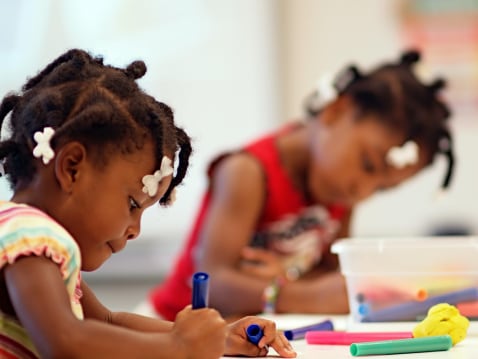
A new report and social media campaign, #BlackGirlsMatter, seeks to change the combined impact of out-of-control school discipline policies and a lack of attention to black girls’ emotional needs. (Photo: Justin Bonaparte/Getty Images)
From elementary school to high school, black girls face discrimination that results in excessive disciplinary actions, disproportionately high rates of expulsion and other factors that not only severely limit their opportunities to excel academically, but also place their health at risk for a lifetime.
In the new report Black Girls Matter: Pushed Out, Overpoliced, and Underprotected, UCLA School of Law professors Kimberlé Crenshaw and Jyoti Nanda, along with UCLA Law alumna Priscilla Ocen, a professor at Loyola Law School, document the combined impact of out-of-control school discipline policies and a lack of attention to black girls’ emotional needs in an effort to bring about change.
The authors note that while a good deal of attention is being paid to the treatment of black boys, the challenges “black and other girls of color confront rarely receive the full attention of researchers, advocates, policy makers and funders.
“As a result, many educators, activists, and community members remain under-informed about the consequences of punitive school policies on girls as well as the distinctly gendered dynamics of zero-tolerance environments that limit their educational achievements.” The report was issued by the African American Policy Forum and Columbia Law School’s Center for Intersectionality and Social Policy Studies.
Primarily using data from New York and Boston, as well as other school districts around the country, Crenshaw, an expert on race, gender and social policy, and her team highlight several incidents and practices that often prevent black girls from graduating from high school:
▪ Excessive discipline. Many examples are included in the report, such as the 2014 case of a 12-year-old girl in Georgia who faced expulsion for writing “hi” on a locker room wall. The little’s girl’s white female classmate was also involved, but she was given far less harsh punishment.
–In New York, the number of disciplinary cases involving black girls was more than 10 times more than those involving their white counterparts and the number of cases involving black boys was six times the number of those involving white boys, despite there being only twice as many black students as white students.
— In Boston, the number of disciplinary cases involving black girls was more than 11 times more than those involving their white counterparts while the number of cases involving black boys was approximately eight times those involving white boys, despite there being less than three times as many black students as white students.
 ▪ High rates of suspension. Research shows that suspending a child from school — even once — can almost double the odds that the child will drop out. Statistics from the U.S. Department of Education, cited by Crenshaw, show that nationally, black girls were suspended six times more than white girls, while black boys were suspended three times as often as white boys.
▪ High rates of suspension. Research shows that suspending a child from school — even once — can almost double the odds that the child will drop out. Statistics from the U.S. Department of Education, cited by Crenshaw, show that nationally, black girls were suspended six times more than white girls, while black boys were suspended three times as often as white boys.
▪ Social factors disrupting education. The report team also found that black girls were disproportionately affected by:
— The trauma of sexual assault and high rates of interpersonal violence, yet, the report authors point out that few initiatives exist to address these issues.
— The burden of family obligations that “undermine their capacity to achieve their academic goals.”

Some black girls are not receiving the support they need at school or at home — a situation that may permanently threaten their economic, physical and emotional well-being. (Photo: African American Policy Forum)
A Lifetime of Poor Health
The report comes out within weeks of the book The New Puberty: How to Navigate Early Development in Today’s Girls by Julianna Deardorff, M.D., and Louise Greenspan, Ph.D. Their research found that 25 percent of little black girls are entering puberty before the appropriate time — showing breast development as early as age 7. Age 9 is early, but now considered normal.
Early puberty is linked to obesity, several cancers, depression, and a higher risk of hypertension and heart disease in adulthood. What’s behind the trend? One key factor is exposure stress or family conflict early in childhood.
Together, the reports suggest that black girls are not receiving the support they need at school or at home — a situation that may permanently threaten their economic, physical and emotional well-being.
Our girls have been left at the margins for too long. Join us in demanding #BlackGirlsMatter. http://t.co/cgQrX4vG3G pic.twitter.com/bJ0XTVXWwl
— AAPF (@AAPolicyForum) February 3, 2015
Making a Difference
Concerned moms may find support and helpful advice in two wonderful resources about raising happy, healthy well-adjusted African American girls: Raising African-American Girls by Linda Ellis Eastman or the website Afro Puffs and Ponytails.
The report authors implore us to “show up for our girls.” Parents and grandparents may find ways to identify and address harmful policies in their daughters or granddaughters school in the report. To support ongoing awareness of these issues, go to the report’s social media page at: #BlackGirlsMatter, which provides helpful tweets and talking points.








